Utimate Guide to Chihuahua Dog
Introduction
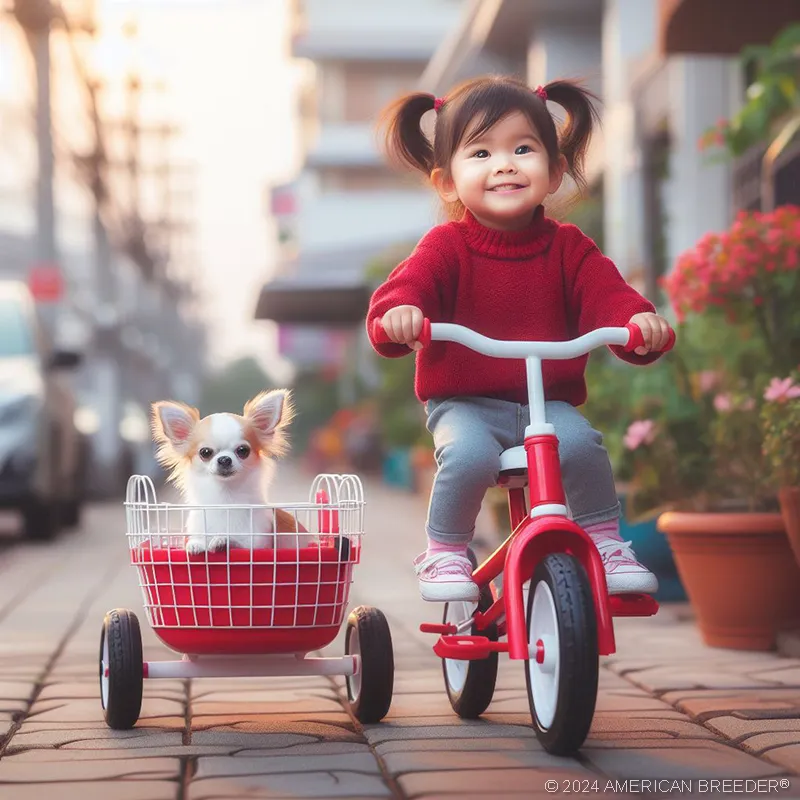 The Chihuahua, often affectionately known as the "Chi," is a pint-sized breed that packs an enormous personality into its tiny frame. Originating in Mexico, Chihuahuas are one of the world's smallest dog breeds, known for their distinctive apple-shaped head, large round eyes, and either short or long coat. Despite their small size, these dogs exude confidence, energy, and a spirited attitude that makes them truly unique.
The Chihuahua, often affectionately known as the "Chi," is a pint-sized breed that packs an enormous personality into its tiny frame. Originating in Mexico, Chihuahuas are one of the world's smallest dog breeds, known for their distinctive apple-shaped head, large round eyes, and either short or long coat. Despite their small size, these dogs exude confidence, energy, and a spirited attitude that makes them truly unique.
Considerations Before Choosing a Chihuahua Dog
Before bringing a Chihuahua into your life, it's important to consider their energetic nature and their potential for attachment to their owners. They thrive on companionship and can form deep bonds, so be prepared for a dog that wants to be by your side. Their tiny size also means that they may not be suitable for households with very young children, as accidental mishandling can lead to injuries. Additionally, their small stature makes them vulnerable to certain health issues, so regular veterinary care and attention are essential.
Interesting Facts and Fun Facts
Chihuahuas have a fascinating history that dates back to ancient Mexico, where they were revered as sacred companions and often believed to possess mystical powers. The breed's name comes from the Mexican state of Chihuahua, where they were discovered in the mid-19th century. Despite their diminutive size, Chihuahuas have a surprisingly long lifespan of up to 14-16 years or more, and they come in a wide variety of coat colors and patterns, adding to their charming appeal. These dogs also have a knack for becoming fiercely loyal to a single person, making them excellent companions for those seeking a strong human-canine bond.
Breed Background and History
 Origin and Development
Origin and Development
The Chihuahua's origins trace back to ancient Mexico, where they were revered by the ancient Toltec civilization as spiritual guides and protectors. These small dogs were believed to possess healing powers and were often used in rituals and ceremonies. Over time, they became companions to various Mexican cultures, including the Aztecs. When Spanish explorers arrived in Mexico, they encountered these dogs and began to export them to Europe. The breed's popularity grew, and by the late 1800s, Chihuahuas were recognized by kennel clubs and gained a foothold in the dog fancy world.
Historical Significance or Cultural Relevance
Chihuahuas have a rich cultural history, closely tied to Mexican heritage. In the 20th century, they gained further prominence when celebrities like actress and singer Carmen Miranda showcased them in films and media, solidifying their status as fashionable and trendy companions. Today, Chihuahuas remain an iconic symbol of Mexican culture, often associated with vibrant festivals and traditions.
Purpose or Original
Use of Chihuahua Dog While Chihuahuas were revered as spiritual companions in ancient Mexico, they also had practical purposes. Some theories suggest they were used for heating beds due to their body heat, while others believe they were kept as companions and watchdogs by royalty. Their small size made them easily transportable, and their alert nature made them excellent at warning their owners of potential threats.
Kennel Clubs that Classify, Group, or Register
Chihuahua Dog Chihuahuas are recognized by major kennel clubs, including the American Kennel Club (AKC) and the Kennel Club in the UK. In the AKC, Chihuahuas belong to the Toy Group, highlighting their small size and companionable nature. This recognition emphasizes their significance and popularity in the canine world.
Appearance
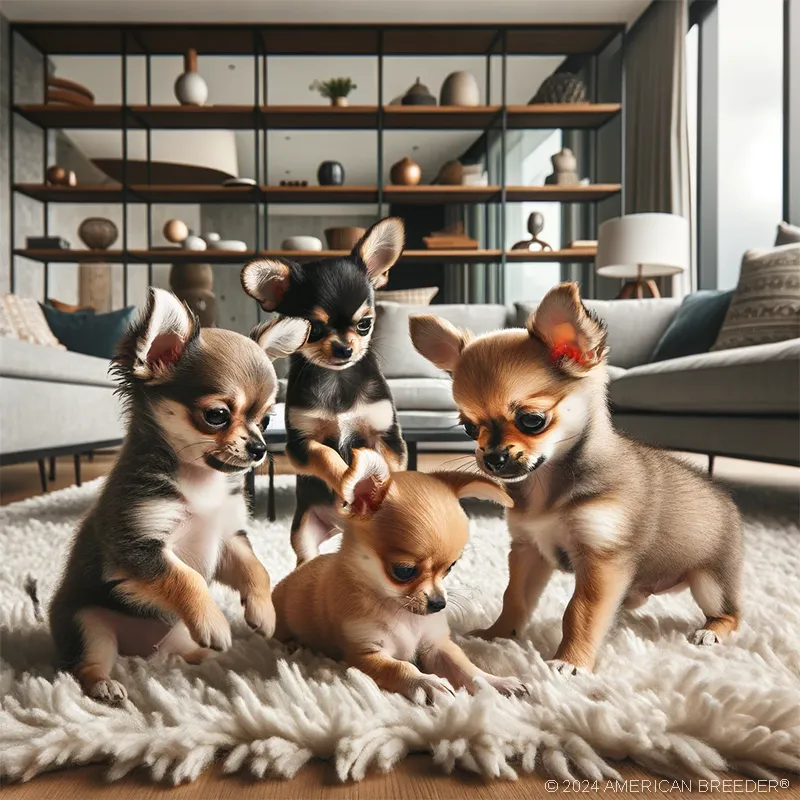 Size, Weight, Activity Level, and Physical Appearance
Size, Weight, Activity Level, and Physical Appearance
Chihuahuas are known for their diminutive size, typically weighing between 2 to 6 pounds and standing about 6 to 9 inches tall. Despite their small stature, they possess a big personality and energy level. Their head is rounded with large, expressive eyes that exude curiosity and intelligence. Depending on the type of coat—either smooth or long—the Chihuahua's coat can come in a wide range of colors and patterns, adding to their charm and variety.
Coat Type, Color Variations, and Patterns
Chihuahuas boast two main coat types: smooth and long. Smooth-coated Chihuahuas have a sleek and glossy coat that requires minimal grooming, while long-coated Chihuahuas have a soft and flowing coat that demands more attention to prevent tangles and matting. Their coat colors span a spectrum that includes fawn, black, white, chocolate, and various combinations of these colors. The Chihuahua's coat diversity is a testament to their appeal and uniqueness.
Distinctive Features or Markings
Beyond their size and coat, Chihuahuas have distinctive features that set them apart. Their ears can be erect or held slightly to the side, and their large, round eyes are a window into their expressive emotions. Their tails are long and plumed, often carried high over their backs. While some Chihuahuas have a traditional apple-shaped head, others might have a deer-like head shape, adding even more variety to the breed's appearance.
Average Litter Size for Chihuahua
Chihuahua litters tend to be relatively small due to the breed's size. The average litter size typically ranges from 1 to 3 puppies, although larger litters can occur. Due to their petite build, Chihuahua mothers may require extra care and attention during the whelping process to ensure the health and well-being of both the mother and her puppies.
With a deep dive into the Chihuahua's appearance, we now turn our focus to their temperament and personality traits.
Temperament and Personality
 Typical Temperament Traits and Behavior Tendencies
Typical Temperament Traits and Behavior Tendencies
Chihuahuas are known for their larger-than-life personalities. Despite their size, they possess an abundance of confidence and are not afraid to assert themselves. They form strong attachments to their human companions and are often loyal to a fault. Chihuahuas are known to be alert and attentive, making them excellent watchdogs who will sound the alarm at the slightest sign of a potential threat.
Energy Levels and Activity Requirements
Chihuahuas might be small, but they are full of energy and zest for life. Their activity levels can vary, but they generally enjoy a good play session, a brisk walk, or even a lively game of fetch. Their energy makes them adaptable to various living situations, whether it's an apartment in the city or a house in the suburbs, as long as they receive sufficient mental and physical stimulation.
Compatibility with Different Lifestyles and Family Dynamics
Chihuahuas are versatile companions that can fit well into various lifestyles. They thrive as both the sole companion of a single person or as a beloved member of a bustling family. Their loyalty makes them excellent lap dogs and cuddle buddies, offering comfort and affection to their owners. However, due to their delicate size, care should be taken when interacting with young children to prevent any accidental injuries.
List of Typical Behavior Issues
Chihuahuas, like any breed, can experience behavior challenges. It's important to address these issues with patience, consistency, and proper training techniques. Common behavior issues in Chihuahuas can include aggression and biting, excessive barking, digging behavior, separation anxiety, resource guarding, and fear and phobias. With appropriate training and socialization, many of these challenges can be managed effectively.
Trainability and Intelligence
 Trainability Level and Ease of Learning
Trainability Level and Ease of Learning
Chihuahuas possess an intelligence that matches their confident demeanor. While they may have a reputation for being stubborn, they are actually quite capable of learning and following commands. However, their strong-willed nature requires a patient and consistent approach to training. Positive reinforcement methods, such as using treats and praise, work best with Chihuahuas, as they respond well to rewards and positive interactions.
Willingness to Please Their Owner
Chihuahuas have a strong bond with their owners and often aim to please. Their loyalty and attachment mean that they are motivated to make their humans happy. While they might occasionally display stubbornness, especially during training sessions, their desire to please and gain approval makes them receptive to training efforts.
Intelligence and Problem-Solving Abilities
Chihuahuas are surprisingly intelligent dogs with a knack for problem-solving. They can quickly learn to adapt to their environment and figure out how to get what they want. This intelligence can sometimes manifest in mischievous behavior if they are not mentally stimulated, so it's important to provide them with engaging activities and challenges to keep their minds sharp and focused.
Recommended Training Approaches and Techniques
When training a Chihuahua, patience and consistency are key. Using positive reinforcement techniques, such as rewards and praise, can help them understand what behaviors are desired. Short, focused training sessions work best to prevent boredom and maintain their attention. Socialization is also crucial, exposing them to various people, animals, and environments to ensure they become well-rounded and confident companions.
Practical Considerations
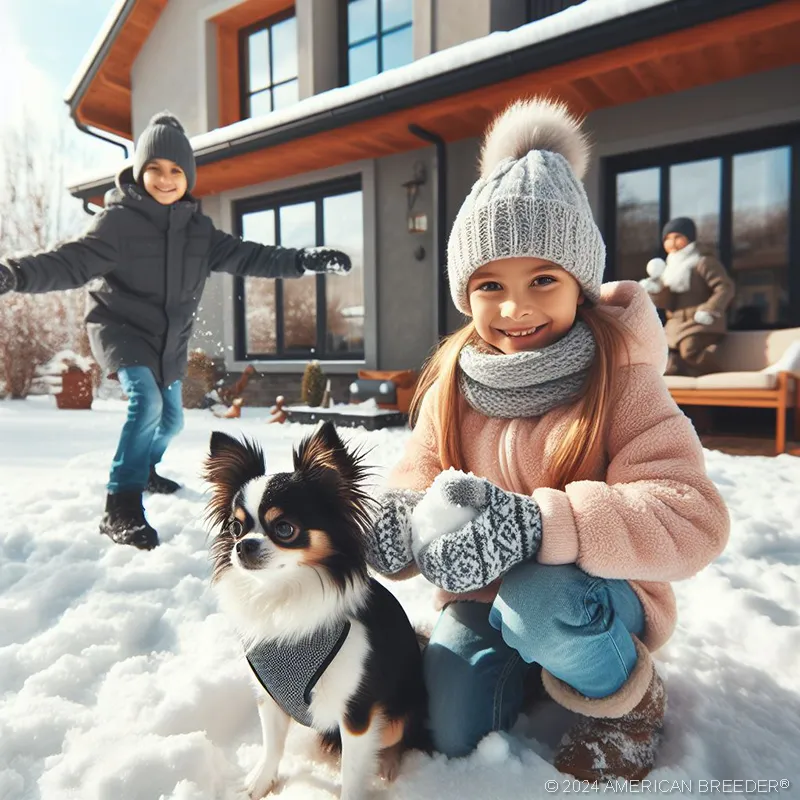 Size of Sleeping Quarters
Size of Sleeping Quarters
Depending on Size Chihuahuas' small size means they are well-suited for indoor living. While they can adapt to various living situations, providing a cozy and comfortable sleeping area is important. A soft and appropriately sized bed or blanket in a quiet corner can become their safe haven, allowing them to rest undisturbed.
Typical Annual Veterinary Cost
Regular veterinary care is essential for maintaining the health of your Chihuahua. Annual check-ups, vaccinations, preventive medications, and potential unforeseen medical expenses are aspects of responsible pet ownership. Budgeting for routine vet visits and considering pet insurance can help manage these costs effectively.
Type of Grooming and Annual Cost
Grooming needs for Chihuahuas vary based on their coat type. Smooth-coated Chihuahuas require minimal grooming, while long-coated ones demand more attention to prevent matting and tangles. Regular brushing, nail trimming, and dental care are essential for their overall well-being. The annual cost for grooming supplies and occasional professional grooming can be budgeted accordingly.
Daily Exercise Needs and Requirements
Chihuahuas may be small, but they have energy to spare. Daily exercise is vital for their physical and mental health. Engaging in short walks, play sessions, and interactive games can help meet their activity needs. It's important to adjust the exercise routine based on their age, energy level, and any potential health considerations.
Level of Playfulness
Chihuahuas have a playful spirit that's endearing to witness. They enjoy interactive games, toys, and activities that challenge their minds and bodies. Incorporating playtime into their daily routine not only provides them with mental stimulation but also strengthens the bond between you and your furry friend.
Level of Intelligence
Chihuahuas' intelligence shines through in their ability to learn quickly and adapt to different situations. This intelligence also means they might find creative ways to entertain themselves if left alone for extended periods. Keeping them mentally engaged through training, puzzles, and interactive toys can prevent boredom and undesirable behaviors.
 Affection Level and Desired Attention
Affection Level and Desired Attention
Chihuahuas thrive on human companionship and affection. They enjoy being close to their owners and often seek out cuddles and lap time. Their affectionate nature makes them wonderful companions for those who are looking for a loyal and devoted furry friend.
Friendliness Toward Strangers
Chihuahuas can be cautious around strangers and may display protective behavior. Early socialization can help them become more comfortable with unfamiliar faces and situations. While they may initially be reserved, they often warm up to people with time and positive interactions.
Grooming Needs and Frequency
Grooming needs vary between smooth and long-coated Chihuahuas. Smooth-coated Chihuahuas have short hair that requires minimal brushing, making them relatively low-maintenance. Long-coated Chihuahuas, on the other hand, require daily brushing to prevent tangles and mats. Regular grooming tasks such as nail trimming, dental care, and ear cleaning are important for maintaining their overall health and well-being.
Feeding Requirements and Dietary Considerations
Feeding a Chihuahua requires attention to portion sizes and nutritional content. High-quality dog food appropriate for their age, size, and activity level is essential. Splitting their daily food intake into multiple small meals can help prevent digestive issues due to their small size. It's important to consult with a veterinarian to determine the most suitable diet for your Chihuahua's individual needs.
Health and Care
Common Health Issues or Predispositions of Chihuahua
While Chihuahuas are generally healthy dogs, there are certain health issues that they may be prone to due to their small size and genetics. Dental problems, such as dental crowding and periodontal disease, are common in Chihuahuas. They may also be susceptible to luxating patella, a condition where the kneecap dislocates from its normal position. Regular dental care and joint health monitoring can help prevent and manage these issues.
Allergies and Specific Dietary Considerations
Chihuahuas can be prone to allergies, which may manifest as skin irritations, itching, or gastrointestinal issues. Paying attention to their diet and ensuring they are not exposed to potential allergens can help mitigate these issues. If allergies are suspected, consulting with a veterinarian to identify triggers and adjust their diet accordingly is important.
 Lifespan and Longevity Expectations
Lifespan and Longevity Expectations
Chihuahuas are known for their long lifespan relative to their size. With proper care, a Chihuahua can live anywhere from 12 to 20 years. Maintaining regular veterinary check-ups, providing a balanced diet, ensuring sufficient exercise, and addressing health issues promptly can contribute to their overall well-being and longevity.
Grooming Requirements
Based on Coat Type and Size Grooming needs for Chihuahuas vary based on their coat type. Smooth-coated Chihuahuas require minimal grooming, while long-coated ones demand more attention to prevent matting and tangles. Regular brushing not only keeps their coat healthy but also provides an opportunity for bonding and detecting any skin issues early.
Exercise Needs and Recommendations for Physical and Mental Stimulation
Chihuahuas may have small bodies, but they have a big need for exercise. Daily walks, interactive play sessions, and mental stimulation activities are essential for their physical and mental well-being. Engaging their minds with puzzles and training games can prevent boredom and contribute to a happy and well-adjusted Chihuahua.
Nutrition and Feeding Guidelines
Providing a balanced and nutritious diet is essential for Chihuahua health. Choosing high-quality dog food that is appropriate for their age, size, and activity level is crucial. Portion control is important to prevent overeating, as Chihuahuas are prone to obesity. Regularly reviewing their dietary needs with a veterinarian ensures that they receive the optimal nutrition for their individual requirements.
Vaccination Schedule and Preventive Care
Following a vaccination schedule is vital for protecting your Chihuahua from preventable diseases. Core vaccinations, which include rabies, distemper, and parvovirus, are essential for their well-being. Non-core vaccines, such as those for kennel cough, should also be considered based on their lifestyle and potential exposure. Regular flea and tick prevention, as well as heartworm prevention, are crucial to their overall health.
Regular Health Check-ups and Vet Visits
Regular visits to the veterinarian are essential for maintaining your Chihuahua's health. Annual check-ups provide an opportunity to monitor their overall well-being, address any concerns, and ensure they are up-to-date on vaccinations and preventive care. Early detection of health issues through regular check-ups can lead to prompt treatment and better outcomes.
Signs of Potential Health Problems and When to Seek Veterinary Attention
Being attuned to your Chihuahua's behavior and habits can help you detect early signs of potential health problems. Changes in appetite, energy levels, mobility, or behavior should not be ignored. If you notice any unusual symptoms or behaviors, seeking veterinary attention promptly can help identify and address underlying health issues.
Socialization and Compatibility
Interaction with Children, Other Pets, and Strangers
Chihuahuas have distinct social preferences that can be influenced by early experiences and proper training. While they can form strong bonds with their families, interactions with children should always be supervised to prevent accidental harm due to their small size. Introducing Chihuahuas to other pets early in life and ensuring positive experiences can lead to harmonious relationships.
Socialization Needs and Tips for Proper Socialization
Early socialization is crucial for Chihuahuas to develop confidence and positive behavior around different people, animals, and environments. Exposing them to a variety of situations during their critical socialization period (between 3 to 14 weeks) helps them become well-adjusted and less likely to develop fear-based behaviors in adulthood.
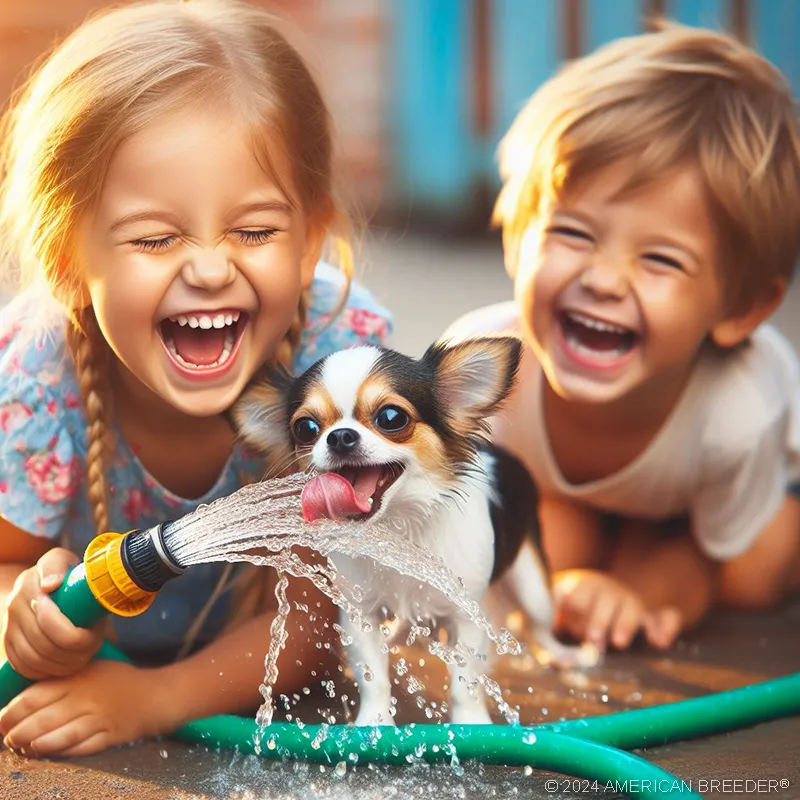 Precautions or Considerations for Multi-Dog Households
Precautions or Considerations for Multi-Dog Households
When introducing a Chihuahua to a household with other dogs, gradual introductions and positive interactions are essential. Monitoring their interactions and ensuring they have their own space can prevent conflicts. Chihuahuas' assertive nature might make them prone to trying to dominate larger dogs, so balanced leadership and proper training are important.
Level of Ease When It Comes to Training Chihuahua
Chihuahuas are intelligent dogs, but their independent nature can sometimes lead to a perception of stubbornness. Training them requires patience, consistency, and positive reinforcement. Their willingness to learn and please their owners can be harnessed effectively with training techniques that focus on rewards and positive associations.
Playtime and Exercise with Other Dogs or Pets
Chihuahuas can engage in playtime with other dogs and pets, but it's important to ensure that the interactions are positive and safe. Monitoring play sessions and preventing overly rough play can help prevent injuries. Early socialization can contribute to a Chihuahua's ability to coexist harmoniously with other pets.
Dog-Friendly Activities and Outings
Chihuahuas may have small legs, but they have big hearts for adventure. While they might not excel in high-intensity activities, they enjoy leisurely walks, strolls in the park, and exploring new environments. Dog-friendly outings provide mental stimulation and sensory experiences that contribute to their well-being.
Living Arrangements and Environment
Suitability for Different Living Arrangements
Chihuahuas are remarkably adaptable when it comes to living arrangements. Their small size makes them suitable for both apartments and houses, as long as they receive the necessary exercise and mental stimulation. However, apartment living can work well for Chihuahuas if their exercise needs are met through daily walks and playtime.
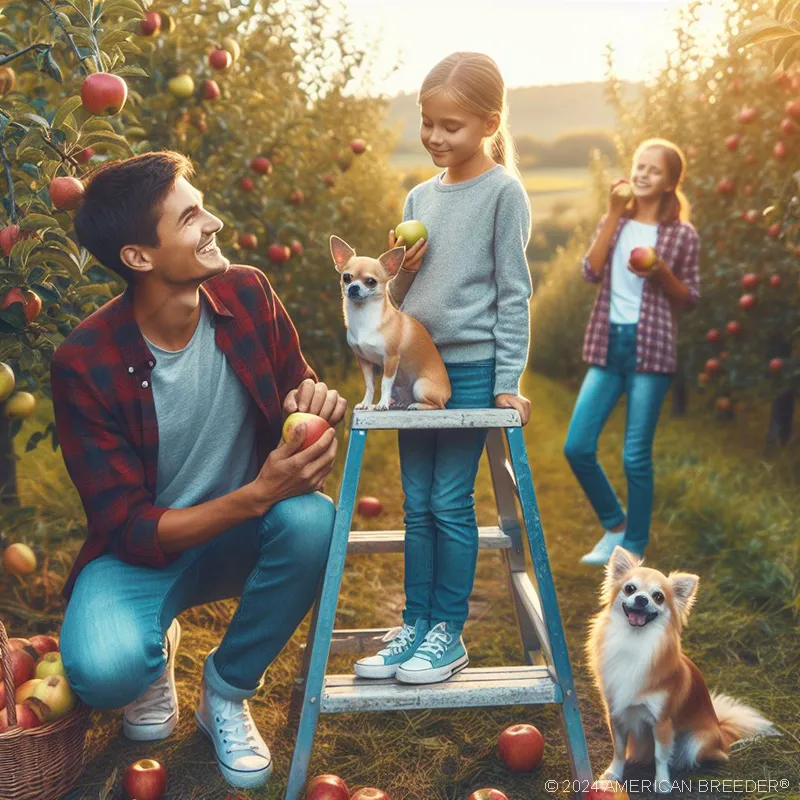 Space Requirements and Exercise Options
Space Requirements and Exercise Options
While Chihuahuas are small, they still require sufficient space to move around comfortably. If you're living in an apartment, providing them with indoor play spaces and regular outdoor walks is essential. For those with larger living spaces or yards, Chihuahuas can benefit from having more room to explore and play.
Climate Considerations and Adaptability
Chihuahuas' small size means they can be sensitive to extreme temperatures. During cold weather, it's important to provide them with warm clothing and ensure they stay cozy indoors. In hot weather, they should have access to shade and cool areas to prevent overheating. Monitoring their comfort in different weather conditions is key to their well-being.
Recommended Yard Size for Chihuahua
If you have a yard, it's important to ensure that it's secure and suitable for a Chihuahua's size. While they don't require a massive yard, having a safe and enclosed space where they can stretch their legs, play, and explore is beneficial. Regular outdoor time allows them to fulfill their natural curiosity and energy needs.
Ideal Living Conditions and Environment
Creating an ideal living environment for your Chihuahua involves a balance of physical comfort and mental stimulation. Providing cozy bedding, safe spaces, and toys can make them feel secure and content. Additionally, incorporating mental enrichment activities, such as puzzle toys and interactive games, can prevent boredom and promote their cognitive well-being.
Training and Obedience
Basic Obedience Training and Commands
Training a Chihuahua requires patience, consistency, and positive reinforcement. Basic obedience commands like sit, stay, come, and down are important for their safety and well-being. By using rewards such as treats, praise, and toys, you can motivate your Chihuahua to learn and obey commands while building a strong bond of trust.
 Advanced Training or Specialized Activities Suited for Chihuahua
Advanced Training or Specialized Activities Suited for Chihuahua
Chihuahuas' intelligence and eagerness to please make them capable of learning advanced tricks and skills. Teaching them more complex commands, like fetch, shake, or roll over, can provide mental stimulation and keep their minds engaged. Additionally, participating in dog sports like agility or obedience competitions can tap into their natural athleticism and energy.
Behavioral Challenges or Specific Training Considerations
Chihuahuas may exhibit behavioral challenges, such as barking, resource guarding, or separation anxiety. Addressing these challenges requires understanding their underlying triggers and employing positive behavior modification techniques. Providing mental enrichment, creating a routine, and using desensitization strategies can help manage and improve their behavior.
House Training and Potty Training Tips
House training a Chihuahua requires consistency, patience, and positive reinforcement. Establishing a routine for bathroom breaks, rewarding successful potty behavior, and supervising them indoors are key to successful house training. Crate training can also aid in preventing accidents and teaching them bladder control.
Leash Training and Walking Etiquette
Leash training is essential to ensure safe and enjoyable walks with your Chihuahua. Start with short, positive walks to get them used to the leash and collar. Teaching them to walk on a loose leash and respond to cues like "heel" or "let's go" can prevent pulling and enhance your walking experience together.
Exercise and Activity
Daily Exercise Needs and Recommendations
Chihuahuas might be small, but they have moderate exercise requirements that contribute to their overall well-being. Daily walks, playtime, and mental stimulation activities are essential to prevent obesity and keep them physically fit. Aim for at least 30 minutes of exercise each day to ensure they stay active and maintain a healthy weight.
Mental Stimulation Activities and Games
In addition to physical exercise, Chihuahuas thrive on mental challenges that engage their intelligent minds. Puzzle toys, interactive feeders, and scent games can provide mental stimulation and prevent boredom. Teaching them new tricks and commands also keeps their minds sharp and strengthens the bond between you and your furry companion.
Exercise Routines and Activity Ideas
Varying your Chihuahua's exercise routine can prevent monotony and keep them excited about physical activities. Along with daily walks, consider incorporating playdates with other dogs, short training sessions, and indoor games like hide-and-seek. These activities not only promote physical fitness but also enhance their social and cognitive skills.
Energy Outlets for High-Energy Breeds
While Chihuahuas are not considered high-energy dogs, some individuals might have bursts of energy that need an outlet. Engaging in short, focused play sessions, agility training, or participating in canine sports can help burn off excess energy. Ensuring they receive both physical and mental exercise can prevent behavioral issues caused by pent-up energy.
Financial Planning
Typical Price Range for Purchasing a Chihuahua
When considering bringing a Chihuahua into your home, it's important to budget for the initial cost of acquiring the dog. The price range for purchasing a Chihuahua from reputable breeders can vary based on factors such as pedigree, lineage, and the breeder's reputation. It's recommended to research and choose a responsible breeder who prioritizes the health and well-being of their puppies.
Initial Costs
Beyond the purchase price, there are other initial expenses to consider when welcoming a Chihuahua into your family. These include adoption fees (if adopting from a shelter), vaccinations, spaying or neutering, microchipping, and basic supplies such as a crate, bed, collar, leash, and food bowls.
Ongoing Expenses
Owning a Chihuahua comes with ongoing financial responsibilities. These include regular expenses such as high-quality dog food, grooming supplies, veterinary care (including annual check-ups and vaccinations), toys, treats, and preventive medications. It's advisable to allocate a monthly budget for these expenses to ensure your Chihuahua's health and well-being are maintained.
Budgeting for Unexpected Medical Costs
Pet insurance can be a valuable investment to help mitigate the financial impact of unexpected medical emergencies or health issues. Research different pet insurance plans to find one that suits your Chihuahua's needs and your budget. Additionally, setting aside an emergency fund for potential medical expenses can provide peace of mind and ensure you're prepared for any unforeseen situations.
Options for Pet Care During Vacations or Travel
When planning vacations or travel, it's essential to factor in the cost of pet care for your Chihuahua. Options include boarding facilities, pet sitters, or trusted friends or family members who can care for your dog in your absence. Proper planning and budgeting for pet care will ensure your Chihuahua's needs are met even when you're away.
Overall Summary
Concise and Cohesive Summary of Key Details
Throughout this guide, we've embarked on a comprehensive journey through the world of Chihuahua dogs. From their rich history and origins to their unique temperament and care needs, we've explored every facet of these charming and captivating companions. Let's recap the essential points that define the Chihuahua experience: Chihuahuas are a small breed with a big personality, originating from Mexico and gaining popularity as beloved companions around the world. They come in various coat types and colors, each with its own distinctive features.
Highlighting Interesting and Fun Facts
Did you know that Chihuahuas have various nicknames, including "Chi" and "Teacup Chihuahuas"? These pint-sized dogs have played significant roles in history, from ancient civilizations to Hollywood screens. Their loyalty and affectionate nature make them excellent family dogs, though proper socialization is key.
Capturing the Breed's Unique Characteristics
Chihuahuas thrive on human companionship and are known for forming strong bonds with their owners. While they have a bold and confident demeanor, they can also be sensitive and require gentle handling. Their small size makes them adaptable to various living arrangements, and they're well-suited to both apartment living and houses with yards.
Creating Excitement and Enthusiasm
Owning a Chihuahua is not just about having a pet; it's about embracing a delightful journey filled with companionship, love, and moments of joy. By understanding their needs, providing proper care, and offering a loving environment, you'll experience a deep and meaningful connection that enriches your life in ways you never thought possible.
Conclusion: A Fulfilling Journey Ahead As we conclude our guide to Chihuahua care and companionship, we encourage you to embark on this journey with open arms and an open heart. From the early days of bringing your Chihuahua home to the years of cherished memories you'll create together, the bond between you and your furry friend will be unlike any other. Cherish the moments, celebrate the quirks, and embrace the responsibilities that come with being a Chihuahua owner. With knowledge, love, and dedication, you'll provide a happy and fulfilling life for your Chihuahua—a loyal companion who will be by your side through every adventure life brings.
Thank you for joining us on this exploration of the Chihuahua world. May your journey with your Chihuahua be filled with wagging tails, affectionate snuggles, and a lifetime of cherished memories.
Chihuahua Dog Quick Reference Guide
Breed Background: Origin: Mexico | Breed Purpose: Companion | AKC Class: Toy | Year Recognized by AKC: 1904 Appearance: Size: Tiny | Weight: 2-6 lbs | Coat Type: Short/Long | Colors & Patterns: Various | Distinctive Features: Small size, large eyes, erect ears
Appearance: Size: Tiny | Weight: 2-6 lbs | Coat Type: Short/Long | Colors & Patterns: Various | Distinctive Features: Small size, large eyes, erect ears
Temperament: Energy Level: 4/5 | Friendliness to Pets: 3/5 | Friendliness to Strangers: 3/5 | Trainability: 3/5 | Playfulness: 3/5 | Protective Nature: 4/5 | Frequent Barker: 4/5 | Chase Instincts: 2/5 | Sense of Smell: 2/5 | Drive to Hunt: 1/5
Health & Care: Health Issues: Patellar Luxation, Dental Problems | Lifespan: 12-20 years | Grooming Difficulty: Low | Exercise Needs: Moderate
Socialization: Interaction with Children: Caution with young kids | Interaction with Pets: Variable, early socialization important | Interaction with Strangers: Cautious | Ease of Training: Moderate
Suitable Living Arrangements: Apartment: Yes | House: Yes | Rural Area: Yes | Yard Size Requirements: Small space sufficient
Training & Obedience: Trainability: 3/5 | Intelligence: 3/5 | Obedience: 3/5 | Problem-Solving: 2/5 | Easily Stimulated: 3/5 | Focus Level: 2/5 | Easily Distracted: 4/5
Financial Planning: Typical Price Range: $400 - $2,500 | Initial Expenses: Puppy essentials, training | Ongoing Annual Expenses: Food, veterinary care
Breeding: Reproductive Maturity: 6-8 months | Litter Frequency: 1-3 litters per year | Litter Size: 1-3 puppies | Stud Cost: Variable | Breeding Challenges: Small size can lead to complications
Did You Enjoy this Article? Share it and Help Us Spread the Word!
If you found this article helpful, we'd appreciate it if you could share it with your friends or link to it from your website, blog, or group! You can also use the convenient social share tabs on the left side of the screen to instantly share this page to your social media feed. For more ways to support and promote the American Breeder Community, visit our Share & Promote Together page for social media posts and memes you can copy and share. Your support means the world to us!
Disclaimer: The information provided in this article is for general informational purposes only and does not constitute legal, medical, financial, or professional advice. While we strive for accuracy, we make no representations or warranties regarding the completeness, accuracy, reliability, or suitability of the information. Please consult with a professional before making decisions based on the content provided. American Breeder Inc. assumes no responsibility for any errors or omissions or for the results obtained from the use of this information.
